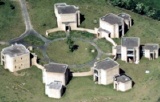Networks: Dynamics and Flows (NET2009)
EPSRC Symposium on the Mathematics of Complexity Science and Systems Biology
28 September - 2 October 2009
 Organisers: MA Kirkilionis, IN Stewart
Organisers: MA Kirkilionis, IN Stewart
Look here for the programme: Programme. Each day of the workshop will be devoted to a different theme gradually building up and exploring the theme.


Fig.: Weighted directed interaction graph used for dynamical systems analysis, with weights both on vertices and edges.
Motivation of this workshop:
The theory of networks is a unifying theme throughout Complexity Science and Systems Biology. Nearly every complex system has an underlying network structure, encoding information like the relations between system components etc. At this level the systems can often be described in a static way, by using all methods and tools derived from graph theory. There is however a large class of network problems where a non-static situation has to be considered. In a wider context these are situations where the interaction between the system components has to incorporate different feedback loops, or the interaction is regulated. In this workshop we will concentrate on rate-based deterministic, stochastic and game-theoretic (i.e. involving local optimisation and learning) dynamical networks, and dynamics of network structures (changing connection strengths, addition and deletion of nodes). Moreover we include flows on networks and discuss the relation of flows and network dynamics. Phenomena to be addressed include synchronisation, robustness, computational capabilities and qualitative behaviour dependent on the network topology. We will include different areas of application from which the abstract theory receives its motivation. These include genetic networks, metabolic networks, neuronal networks, economic networks and social networks. The emphasis is on biological applications, each day will discuss methods from other fields for their applicability to Systems Biology. The workshop will have a strong mathematical orientation, and discuss the relevance of mathematical techniques to various branches of network theories.

Fig.: The endoplasmic reticulum is a strikng example of a biological network structure.
See also:
Mathematics Research Centre
Mathematical Interdisciplinary Research at Warwick (MIR@W)
Past Events
Past Symposia
Where possible, visitors should obtain an EDUROAM account from their own university to enable internet access whilst at Warwick.
You can register for any of the symposia or workshops online. To see which registrations are currently open and to submit a registration, please click hereLink opens in a new window.
Mathematics Research Centre
Zeeman Building
University of Warwick
Coventry CV4 7AL - UK
E-mail:
MRC@warwick.ac.uk

